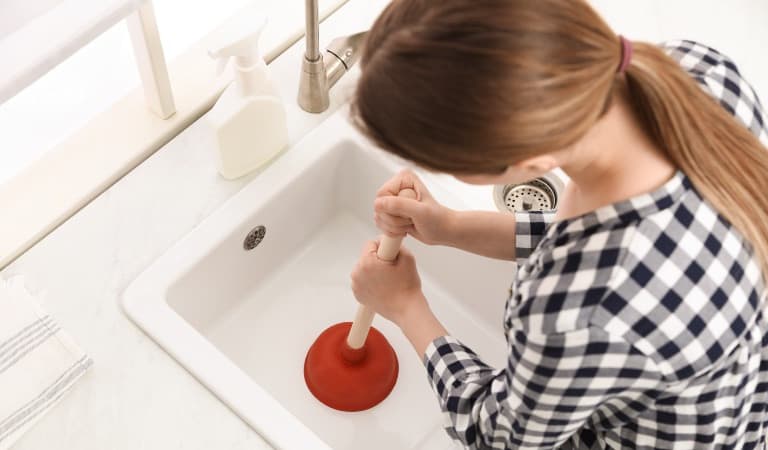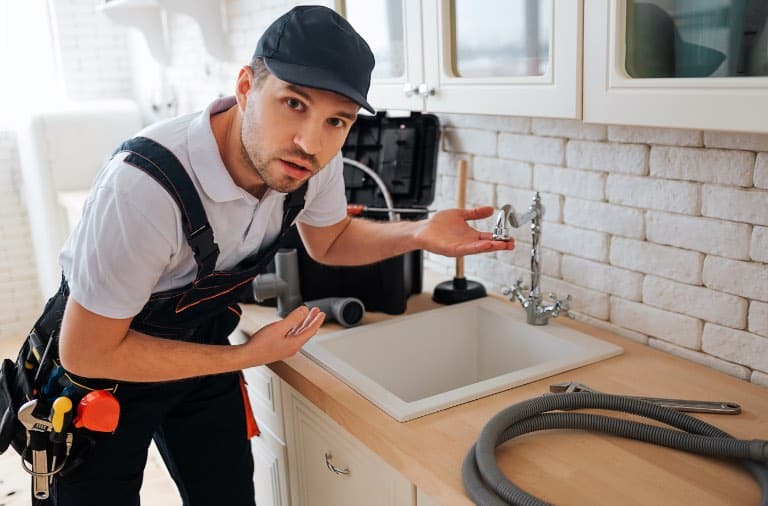Are you a tenant who’s ever wondered, “Can a landlord charge for plumbing repairs?” Well, you’re not alone! This question is more common than you might think.
As a responsible tenant, it’s essential to understand your rights and obligations regarding plumbing repairs in a rental property.
In this blog post, we’ll dive into the intricacies of landlord and tenant responsibilities, the Landlord and Tenant Act, and the all-important tenancy agreement.
We’ll also clarify who’s responsible for common plumbing issues, from blocked drains to leaking pipes, and what to do when a plumbing emergency arises.
So, let’s unravel the mysteries of plumbing responsibilities in a rental property!
Generally, it’s the responsibility of the landlord to maintain the plumbing systems in good working order, including pipes, drains and sanitary fixtures. However, tenants may be held accountable for damages caused by their negligence or misuse, such as clogged drains due to inappropriate items being flushed.
According to the landlord and tenant act, it’s generally the landlord’s responsibility to ensure that plumbing systems within the property are in proper working order. This includes pipes, drains, toilets, boilers, and other sanitary fixtures.
If a leak, blockage, or other plumbing problem arises from normal wear and tear, the landlord is typically responsible for fixing it and paying the plumber.
However, there are exceptions. If the issue is caused by the tenant’s negligence, such as a clogged drain due to misuse, the tenant may be held responsible for the repair costs.
Referring to your tenancy agreement for specific plumbing responsibilities and repair clauses is always a good idea.
Contents
Can a Tenant Be Held Responsible for Plumbing Repairs?
While landlords are generally responsible for maintaining the plumbing systems in rental properties, tenants may find themselves accountable for repairs if they cause the damage.
If a tenant clogs the toilet by flushing non-flushable items or causes a leak by misusing the plumbing fixtures, they could be responsible for the repair costs. To avoid confusion or disputes, tenants and landlords must carefully review their tenancy agreements and understand the terms.
Tenants should report any plumbing issues promptly to their landlords, and landlords should address these issues promptly to ensure the rental property remains habitable and safe for the tenants. Remember, plumbing issues can quickly escalate into more significant problems, causing damage to the property and creating health hazards.
By being proactive and addressing any plumbing repairs promptly, landlords and tenants can ensure a smooth rental experience for everyone involved.
Common Plumbing Problems in Rental Properties
Like any other housing, rental properties are susceptible to various plumbing issues. Some of the most common problems include:
1. Leaking Toilets and Taps: Leaks can lead to waste and potential water damage if not addressed promptly. Tenants should report any leaks to their landlords immediately.
2. Kitchen Sink Clogs: Grease, food scraps, and other debris can accumulate in the kitchen sink pipes, leading to clogs and backups. To prevent this issue, tenants should avoid pouring grease down the drain and use strainers to catch food particles.
3. Toilets Not Flushing Properly: A toilet that doesn’t flush correctly can be caused by various factors, including clogs, low water levels, or a faulty cistern. Landlords should ensure that the toilets in their rental properties function correctly and that tenants know how to maintain them.
4. Shower and Bathtub Clogs: Hair, soap scum, and other debris can accumulate in shower and bathtub drains, causing clogs and backups. Regular cleaning and using drain strainers can help prevent these issues.
To maintain a safe and comfortable living environment, tenants should promptly report any plumbing problems to their landlords. In contrast, landlords should address these issues promptly and educate tenants on proper plumbing maintenance.
By working together and being proactive, tenants and landlords can ensure that the rental property remains in good condition and that any plumbing problems are resolved efficiently.

Resolving Disputes Over Plumbing Repairs
Disputes over plumbing repairs between landlords and tenants can be frustrating and challenging, often requiring clear communication and understanding of who is responsible for the plumbing. Here are some practical steps to help resolve these disputes effectively:
1. Review the Tenancy Agreement: Start by reviewing the tenancy agreement to clarify each party’s responsibilities regarding plumbing repairs. Understanding the terms of the agreement can help provide a clear framework for resolving the dispute.
2. Communicate Openly and Honestly: Open communication is key to resolving any dispute related to plumbing issues in a rental property. Both parties should express their concerns and actively listen to each other’s perspectives. This can help clarify misunderstandings and pave the way for a mutually beneficial outcome.
3. Gather Evidence: If the dispute involves damage caused by the tenant, gather evidence, such as photographs or video recordings, to support your case and clarify who should pay for plumbing repairs. Similarly, if the landlord is responsible for the repair, provide documentation, like maintenance records, to demonstrate the issue.
4. Seek Mediation: If the dispute, perhaps over plumbing issues in a rental, cannot be resolved through direct communication, consider seeking the help of a neutral third party, such as a mediator. A mediator can facilitate a discussion and help both parties reach a compromise.
5. Consult Legal Professionals: If the dispute escalates and cannot be resolved through mediation, consult legal professionals for guidance.
As a tenant dealing with a plumbing issue in your rental property, it’s essential to take the following steps:
First, identify the problem and gather as much information as possible about its cause and location. Document the issue with photographs or videos to provide visual evidence for your landlord.
Next, notify your landlord about the problem as soon as possible, providing them with the details you’ve gathered. Communicate in a respectful and professional manner.
Follow up with your landlord if they cannot address the issue immediately, keeping a record of your communications. When your landlord schedules a repair, make sure to allow access to the property at the agreed-upon time and be present during the repair, if possible.
Following these steps can effectively address plumbing issues and maintain a positive relationship with your landlord.
Preventing Plumbing Issues: A Tenant’s Guide to Maintenance and Use
Preventing plumbing issues is essential for maintaining a comfortable living environment in a rental property.
First, it’s important to dispose of food waste correctly. Avoid pouring grease, oil, or food scraps down the kitchen sink. Instead, toss them in the trash or a compost bin.
Next, remove hair from the shower, bath, and sink drains regularly. Drain strainers can help catch hair and other debris, preventing clogs.
When it comes to the toilet, only flush toilet paper and human waste. Flushing wipes, paper towels, or hygiene products can cause clogs and backups.
Also, be gentle with plumbing fixtures to prevent any damage. If you notice any plumbing issues, report them to your landlord immediately. Prompt attention can help prevent minor problems from becoming major ones.
By following these tips, you can help prevent plumbing issues and maintain a comfortable living environment in your home. Just remember to check the condition of plumbing fixtures regularly and address any issues promptly to keep things running smoothly.
Related Articles
How Long Can You Leave a Tenant Without Hot Water?
Is The Landlord Responsible For Fixing A Washing Machine?
Does A Landlord Have To Provide Receipts For Repairs?
Conclusion
In a nutshell, plumbing duties in a rental property are a team effort between landlords and tenants.
Landlords usually handle maintenance and repairs of plumbing systems. However, tenants could be liable for problems resulting from neglect or misuse.
Knowing your tenancy agreement can prevent disagreements and keep the rental property running smoothly. By treating the property with care and quickly reporting issues, tenants contribute to a secure and comfortable living space, making the rental experience better for all.

